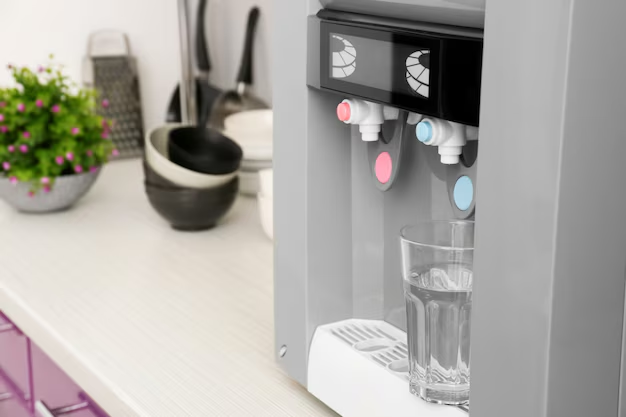Can Refrigerator Filters Remove Nitrates from Your Water?
When you think of keeping your refrigerator in tip-top shape, you often consider cleaning the interior or making sure the door seals are tight. However, one of the most crucial yet often overlooked components of your fridge is the water filter. These filters play a significant role in ensuring the water and ice that come from your refrigerator are safe to consume. One common question that arises is: Can refrigerator filters remove nitrates from your water? Let's explore this key concern and what it means for your home setup.
Understanding Nitrates: A Brief Overview
Nitrates are compounds found naturally in the environment. They are often present in soil, water, and even food. While nitrates themselves are not harmful, they can turn into nitrites, which can pose health risks, especially for infants and pregnant women. Sources of nitrates include:
- Fertilizers and agricultural runoff
- Industrial waste
- Septic systems and sewage
When these substances seep into water supplies, they can contribute to nitrate contamination, which is a point of concern for many homeowners.
Refrigerator Filters: What Are They Designed to Do?
Filtration Basics
Refrigerator water filters are primarily designed to improve the taste and smell of water. They do this by using activated carbon to remove chlorine, sediment, and other impurities commonly found in tap or well water.
Common Contaminants Addressed
These filters commonly target:
- Chlorine and its by-products: Helps in reducing bad taste and smell.
- Sediments: Particles like rust and dirt.
- Heavy metals: Such as lead and mercury.
The focus on these contaminants is due to their widespread presence and the direct impact they have on water flavor and odor.
Nitrate Filtration: Can Your Refrigerator Handle It?
Limitations of Typical Refrigerator Filters
Despite their efficacy in removing certain contaminants, standard refrigerator filters struggle with nitrates for a few reasons:
- Molecular Size: Nitrates are small and can pass through the carbon filters easily.
- Specialized Technology Needed: Nitrate removal typically requires specific ion-exchange resin filters, which are not standard in most refrigerator models.
When Do You Need Specialized Filters?
If you live in an agricultural area or are using well water, it may be wise to consider testing your water for nitrate levels. Should you find elevated levels:
- Consider Whole-House Filters: These systems focus on a broader spectrum of contaminants, including nitrates.
- Point-of-Use Nitrate Filters: Specific products are designed exclusively to tackle nitrate contamination.
Installation & Setup: Enhancing Your Filtration System
Choosing the Right System
If you determine the need for better nitrate filtration:
- Assess Your Existing Equipment: Evaluate whether upgrading to a more comprehensive system is feasible.
- Consult with Experts: They can recommend the best type of filter for your needs.
Steps to Upgrade
- Identify Your Needs: Test your water and understand what contaminants are present.
- Research Appropriate Filters: Look for filters that specifically list nitrate removal among their capabilities.
- Install Properly: Follow guidelines to integrate new systems with your current setup.
Maintenance: Keeping Your Filters Effective
Regular Replacement
Filters need to be replaced regularly to maintain efficiency. Neglecting this can reduce their effectiveness and potentially introduce contaminants.
- Follow Manufacturer Guidelines: Replace filters as instructed, usually every six months.
Cleaning and Inspections
- Regular Cleaning: Ensure that there is no buildup in or around filter areas.
- Inspect Seals and Connections: This helps to prevent leaks and maintains water pressure.
Health Considerations: Why It Matters
Potential Health Impacts
High nitrate levels are particularly concerning for:
- Infants: Can lead to blue baby syndrome, affecting oxygen transport in the bloodstream.
- Pregnant Women: There's a possible association with pregnancy complications.
Risk Mitigation
- Water Testing: Regularly test your water, especially if you're in a vulnerable area.
- Consult Professionals: If elevated nitrates are found, consider engaging water quality experts.
Summary: Key Steps for Homeowners 🏠
Here's a quick checklist to ensure your water is safe from nitrates:
- Test Your Water: Know the composition and levels of contaminants.
- Select Appropriate Filters: Ensure that your filtration system matches your water quality needs.
- Maintain Your System: Regular maintenance and filter replacement are crucial.
- Stay Informed: Understand the health implications of nitrates and how best to avoid them.
By being proactive about your water quality, you can safeguard the health of everyone in your household. Remember, while standard refrigerator filters enhance taste and remove common contaminants, specialized systems are necessary for effectively managing nitrates. Always be proactive about maintenance and stay informed on your local water conditions to ensure your home’s water remains safe and clean.

